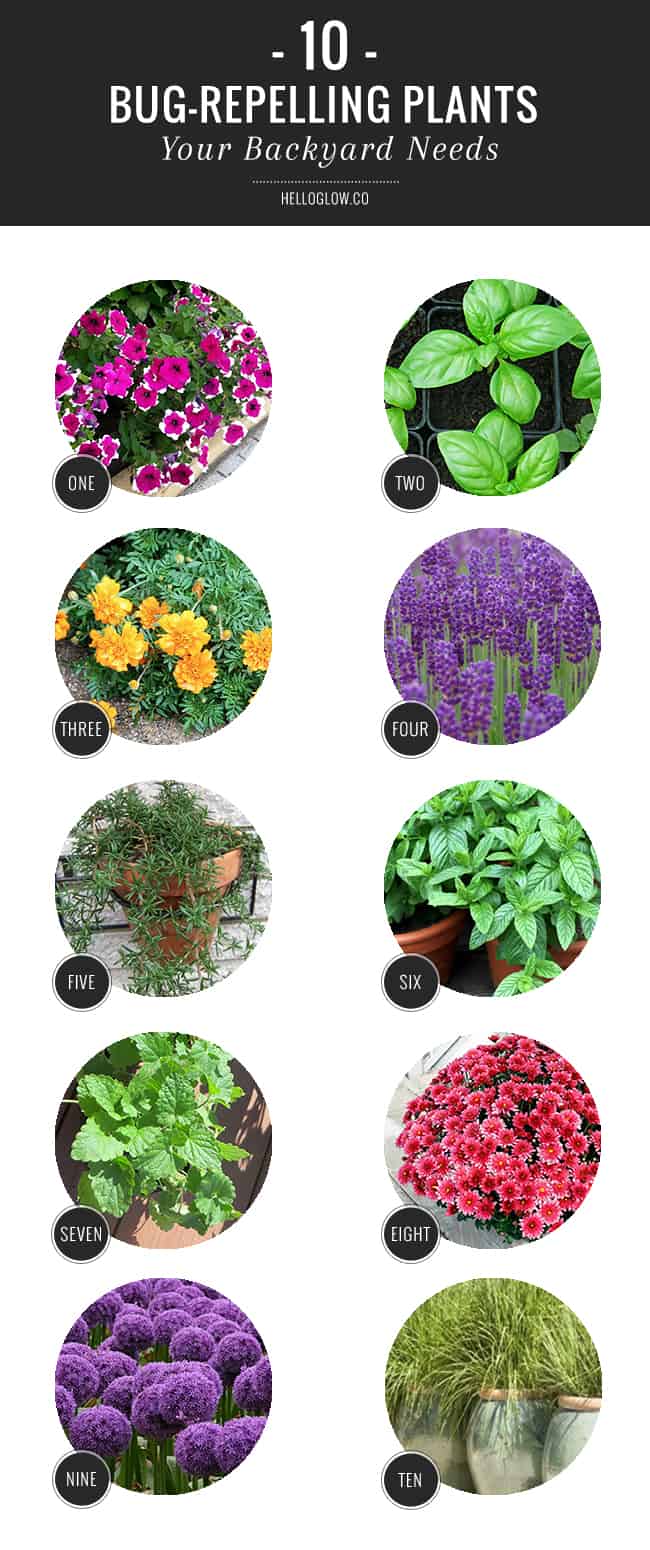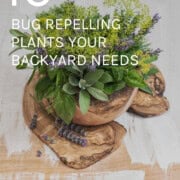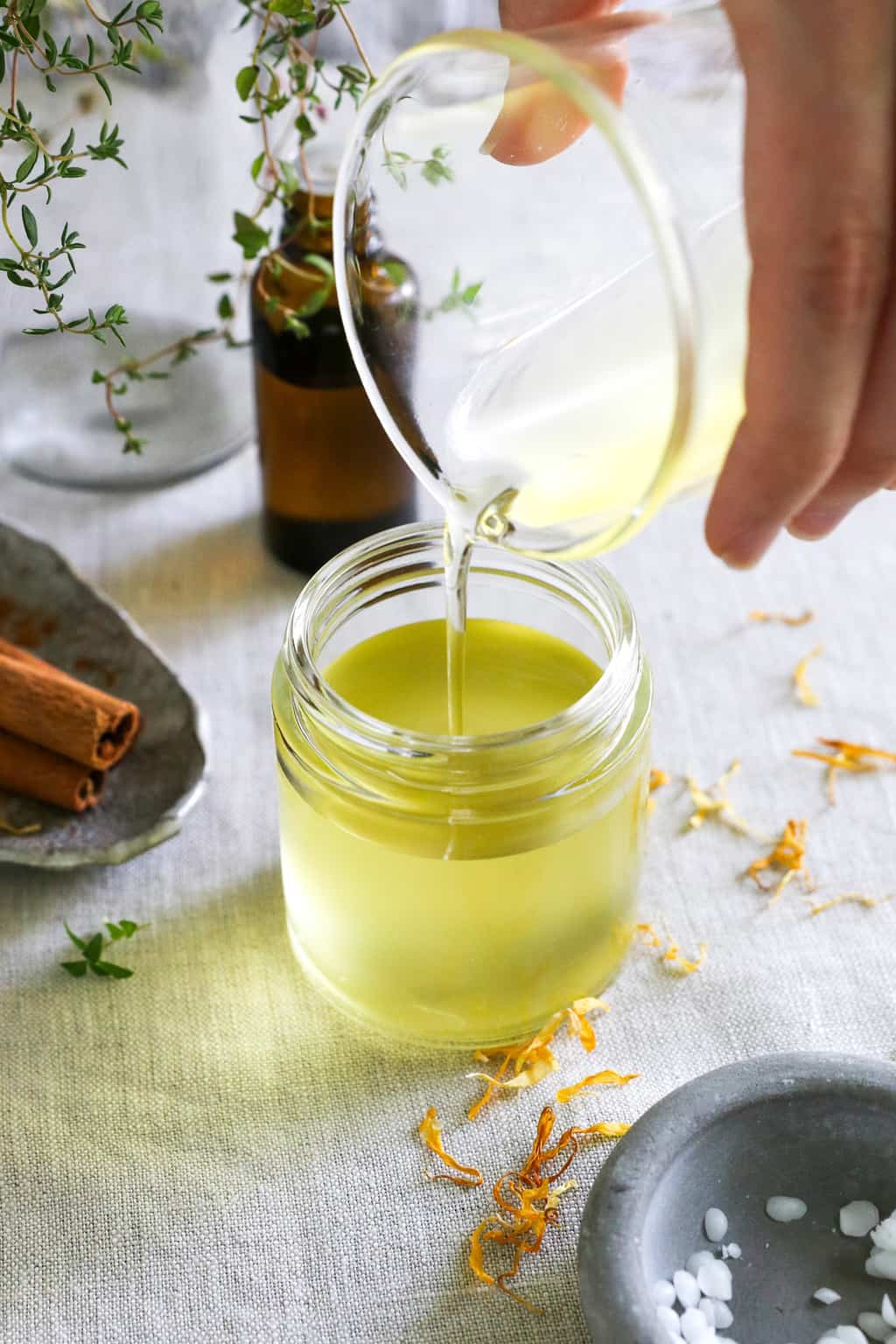If there's anything I've learned from spending about 30-ish summers in Minnesota, it's this: nothing ruins a patio party faster than mosquitoes (except maybe red ants or biting flies). Mosquitoes, flies, beetles, and other pesky party poopers are mega-annoying when you're trying to enjoy the outdoors—and even worse when they make their way inside—but there's no need to spray down your yard with industrial-strength insecticide.
Plants are experts at repelling bugs as a defense strategy so they don’t get eaten [source]. And just like how they can clean the air indoors, a few strategically placed bug-repelling plants will help ward off insects, allowing you to dine al fresco in peace. By incorporating these plants, you can create a natural barrier against pests while enhancing the beauty and utility of your backyard.

10 Bug-Repelling Plants Your Backyard Needs
Here is a great list of 10 common, easy-to-find bug-repelling plants to try. And not only will these ward off unwanted critters, but you can use the herbs to make your next cookout even tastier. For an extra layer of protection, check out our post on 13 essential oils that repel bugs naturally!
1. Petunias
These bright-colored beauties are from the nightshade family (Solanaceae), and they make alkaloid substances that work as “chemical weapons” against insects that try to eat them [source]. Because of this, they are often planted to repel squash bugs, beetles, and aphids. They need a sunny spot, so try planting them near your vegetable garden or in a window box.
2. Basil
Basil emits a strong aroma that deters flies and mosquitoes, making it a dual-purpose plant for both pest control and kitchen use. Of all the bug-repelling plants, basil is my favorite. There's an oil in basil that kills mosquito eggs! Plant basil in pots near gathering areas to ward off flies and mosquitoes and for use in pesto!
3. Marigolds
These pretty, sun-loving plants are often used by farmers as companion plants near their important crops to keep pests at bay. Turns out they give off an airborne substance called limonene that protects against flies [source]. Marigolds are well-known for their ability to deter mosquitoes and aphids, thanks to their distinct scent.
4. Lavender
The same scent that calms us down, aids our insomnia, and makes our linens smell amazing is absolutely disgusting to flies, moths, and mosquitoes. Plant it if you have a sunny garden, or keep a few bouquets around to ward off these pests. Lavender, with its pleasant fragrance, not only repels moths, fleas, flies, and mosquitoes but also adds a touch of beauty to any garden.
5. Rosemary
In addition to repelling mosquitoes, rosemary bushes have two potent insecticides that seem to work together, 1,8-cineole and camphor [source], which will help protect your vegetable plants from infestation. Rosemary keeps mosquitoes and other insects at bay while thriving in a sunny spot with well-drained soil.
6. Mint
One of the more pleasant-smelling plants for our species (along with its cousin, lemon balm), the scent of mint helps repel biting insects of all kinds [source]. It's best to plant mint in pots because it will spread like crazy and crowd out the other plants in your garden.
7. Catnip
Also a member of the mint family, catnip has been shown in one study to repel flies in cattle feedlots (now that’s pretty potent stuff!) [source]. Catnip repels bugs—thanks to its active ingredient nepetalactone, the same natural compound that attracts cats. Go figure!
8. Chrysanthemums
Pyrethrins, found in chrysanthemums [source] and used in many commercial insect repellents, keep mosquitoes, roaches, beetles, ticks, cockroaches, and silverfish away.
9. Alliums
Chives, leeks, onions, garlic, scallions, and shallots fall into this group. These plants grow tall with pretty purple, white, or pink flowers and contain a substance called lectin [source] that helps to protect other veggies (and your yard) from slugs, flies, and worms, although they can attract moths. Be warned that, like garlic and onions, allium plants can be extremely toxic to dogs and cats.
10. Lemongrass
Citronella is the oil found in lemongrass (creating its slight citrus scent). Lemongrass needs tons of sun, so most of us will have to enjoy it as an annual in the summer.
How do I Repel Stubborn Bugs?
(This section answers some of the questions that kept popping up in the comments. If you're more of a backyard barbecuer than a gardener, the plants mentioned above should do the trick.)
While most plants do double duty and repel a wide variety of insects, you may still be left with a few stubborn offenders that just won't take a hint. Here's how to target those recalcitrant bugs (of the mostly non-flying variety) and keep them out of your yard.
Bees
Bees do a lot of good things for the environment, and they're a welcome visitor in many gardens. But if you're allergic or just don't like them being so close to your house, you can encourage them to go elsewhere with the help of wormwood, eucalyptus, and basil.
Slugs
Slugs are a pesky problem for many gardeners, but luckily, there are few plants that they can't stand. Aromatic herbs such as thyme, rosemary, and basil are said to repel slugs. You can also try setting up slug traps using the bottom of an old soda bottle and fresh beer. Just pour the beer into the cut-off end of a soda bottle and nestle it into the dirt so the slugs can climb in and, hopefully, not be able to get back out.
Caterpillars
While we can all agree that butterflies are a welcome sight most of the time, their caterpillar cousins can actually do a lot of damage to trees and foliage. Use lavender, peppermint, sage, and mugwort to deter caterpillars far away from your yard.
Grasshoppers
Locusts and grasshoppers have been plaguing humans for centuries. Keep them away with the help of lilac, forsythia, and moss rose.
How Do I Prevent Bugs in My Backyard?
While stocking up on bug-repelling plants, there are a few extra steps you can take to keep the bugs away for good.
Get rid of standing water. You've probably heard this one already, but bird baths, buckets, clogged gutters, and leaky hoses create an instant breeding ground for bugs. Walk around your yard, checking to make sure there isn't any standing water you've forgotten about.
Use fans. This one's easier said than done, but bugs can't stand up to a little breeze. Either install patio fans, or use portable fans to keep the most irritating offenders at bay.
Keep food covered. When eating outdoors, always keep a cover on your food (preferably with plastic wrap or tin foil) to prevent the smell from attracting bugs.
Hide the trash can. Just like food, trash has a way of attracting bugs from miles away. Keep all garbage and recycling covered, and place your cans far away from where you'll be hanging out.
Harness the power of citronella. One of the oldest bug repellants in the book, citronella can be used to make powerful citronella diffusers or bug-busting citronella candles.
Follow up with a patio spray or an essential oil diffuser. Make a lemon-mint patio spray or an essential oil blend to disguise food smells and turn off any bugs already in the area.
References:
1. Ibanez S, et al. Plant insecticidal toxins in ecological networks. Toxins (Basel). 2012.
2. Chowański S, et al. A review of bioinsecticidal activity of Solanaceae alkaloids. Toxins (Basel). 2016.
3. Conboy NJA, et al. Companion planting with French marigolds protects tomato plants from glasshouse whiteflies through the emission of airborne limonene. PLoS One. 2019.
4. Tak JH, et al. Enhanced cuticular penetration as the mechanism for synergy of insecticidal constituents of rosemary essential oil in Trichoplusia ni. Sci Rep. 2015.
5. Singh P, et al. Prospective of essential oils of the genus Mentha as biopesticides: a review. Front Plant Sci. 2018.
6. Zhu JJ, et al. Repellency of a wax-based catnip-oil formulation against stable flies. J Agric Food Chem. 2010.
7. Chen M, et al. Action of six pyrethrins purified from the botanical insecticide pyrethrum on cockroach sodium channels expressed in Zenopus oocytes. Pestic Biochem Physiol. 2018.
8. Upadhyay S, et al. Receptors of garlic (Allium sativum) lectins and their role in insecticidal action. Protein J. 2012.
This article was medically reviewed by Dr. Gina Jansheski, a licensed, board-certified physician with more than 20 years of practice experience. Learn more about Hello Glow's medical review board here. As always, this is not personal medical advice, and we recommend that you talk with your doctor.
50




